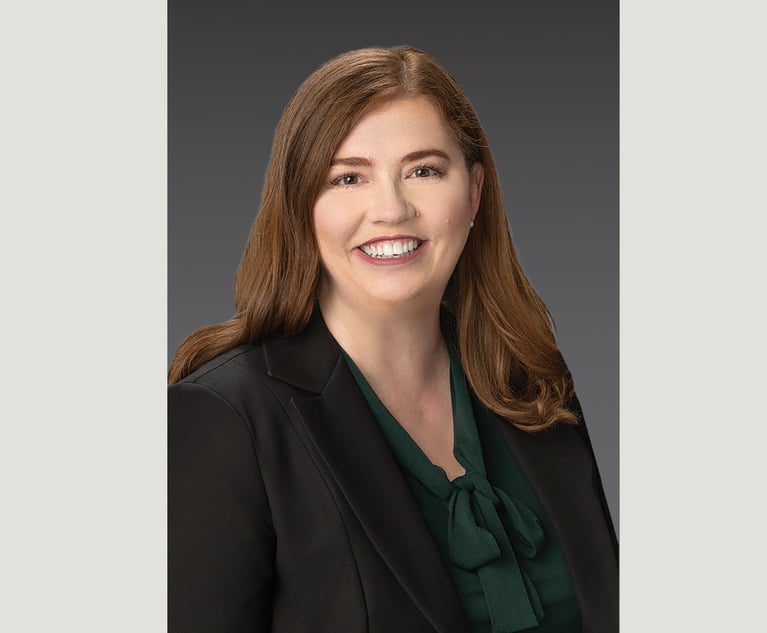Two Eighth Circuit Appeals Could Significantly Affect Consumer Protection Class Actions
Two appeals ask the Eighth Circuit to consider whether one state's consumer-protection laws can apply to plaintiffs from all 50 states.
March 11, 2021 at 11:45 AM
11 minute read
Can the consumer protection laws of a corporate defendant's home state, where complained-of activities allegedly occurred, apply to the claims of plaintiffs from all 50 states? That is a  question that is presently before the Eighth Circuit in two pending appeals.[1] And because a court typically denies certification of a nationwide class when it finds that different states' laws apply to different plaintiffs, the answer to that question could significantly affect consumer protection class actions.
question that is presently before the Eighth Circuit in two pending appeals.[1] And because a court typically denies certification of a nationwide class when it finds that different states' laws apply to different plaintiffs, the answer to that question could significantly affect consumer protection class actions.
The defendants in Hudock v. LG Electronics U.S.A., appealed a decision from the District of Minnesota certifying a nationwide class of consumers.[2] The Hudock decision held that, as a matter of constitutional due process and Minnesota's choice-of-law rules, the law of each corporate defendant's home state could be applied to claims against it by plaintiffs from all 50 states.[3] One day later, conducting a similar due-process and choice-of-law analysis, a different judge in the same district ruled in Johannessohn v. Polaris Industries that the law of a plaintiff's state of residency applies to that plaintiff's consumer protection claims and denied class certification.[4] Plaintiffs appealed the Polaris decision. Although class certification and choice-of-law issues are generally fact intensive, the Eighth Circuit's decisions on these appeals will be of interest to retail industry groups, consumer protection advocates, and corporate defendants, as reflected by the number of amicus briefs filed in the appeals.
This content has been archived. It is available through our partners, LexisNexis® and Bloomberg Law.
To view this content, please continue to their sites.
Not a Lexis Subscriber?
Subscribe Now
Not a Bloomberg Law Subscriber?
Subscribe Now
NOT FOR REPRINT
© 2025 ALM Global, LLC, All Rights Reserved. Request academic re-use from www.copyright.com. All other uses, submit a request to [email protected]. For more information visit Asset & Logo Licensing.
You Might Like
View All
Shareholder Democracy? The Chatter Elon Musk’s Tesla Pay Case Is Spurring Between Lawyers and Clients
6 minute read
Are Counsel Ranks Getting 'Squeezed' as Nonequity and Associate Pay Grows?
5 minute read
AI's Place in Big Law Broadens, As Firms Embrace Fresh Uses of the Technology

'Be Prepared and Practice': Paul Hastings' Michelle Reed Breaks Down Firm's First SEC Cybersecurity Incident Disclosure Report
Trending Stories
- 1California's Chief Justice Starts Third Year With Questions About Fires, Trump and AI
- 2Justin Baldoni Sues Blake Lively and Ryan Reynolds for $400M in New Step in 'It Ends With Us' Fight
- 3Top Leadership Changes Coming for NJ Attorney General's Office
- 4SCOTUSBlog Co-Founder Tom Goldstein Misused Law Firm Funds, According to Federal Indictment
- 5Patreon Hit With Lawsuit for Allegedly Diverting Subscriber Data to Meta
Who Got The Work
J. Brugh Lower of Gibbons has entered an appearance for industrial equipment supplier Devco Corporation in a pending trademark infringement lawsuit. The suit, accusing the defendant of selling knock-off Graco products, was filed Dec. 18 in New Jersey District Court by Rivkin Radler on behalf of Graco Inc. and Graco Minnesota. The case, assigned to U.S. District Judge Zahid N. Quraishi, is 3:24-cv-11294, Graco Inc. et al v. Devco Corporation.
Who Got The Work
Rebecca Maller-Stein and Kent A. Yalowitz of Arnold & Porter Kaye Scholer have entered their appearances for Hanaco Venture Capital and its executives, Lior Prosor and David Frankel, in a pending securities lawsuit. The action, filed on Dec. 24 in New York Southern District Court by Zell, Aron & Co. on behalf of Goldeneye Advisors, accuses the defendants of negligently and fraudulently managing the plaintiff's $1 million investment. The case, assigned to U.S. District Judge Vernon S. Broderick, is 1:24-cv-09918, Goldeneye Advisors, LLC v. Hanaco Venture Capital, Ltd. et al.
Who Got The Work
Attorneys from A&O Shearman has stepped in as defense counsel for Toronto-Dominion Bank and other defendants in a pending securities class action. The suit, filed Dec. 11 in New York Southern District Court by Bleichmar Fonti & Auld, accuses the defendants of concealing the bank's 'pervasive' deficiencies in regards to its compliance with the Bank Secrecy Act and the quality of its anti-money laundering controls. The case, assigned to U.S. District Judge Arun Subramanian, is 1:24-cv-09445, Gonzalez v. The Toronto-Dominion Bank et al.
Who Got The Work
Crown Castle International, a Pennsylvania company providing shared communications infrastructure, has turned to Luke D. Wolf of Gordon Rees Scully Mansukhani to fend off a pending breach-of-contract lawsuit. The court action, filed Nov. 25 in Michigan Eastern District Court by Hooper Hathaway PC on behalf of The Town Residences LLC, accuses Crown Castle of failing to transfer approximately $30,000 in utility payments from T-Mobile in breach of a roof-top lease and assignment agreement. The case, assigned to U.S. District Judge Susan K. Declercq, is 2:24-cv-13131, The Town Residences LLC v. T-Mobile US, Inc. et al.
Who Got The Work
Wilfred P. Coronato and Daniel M. Schwartz of McCarter & English have stepped in as defense counsel to Electrolux Home Products Inc. in a pending product liability lawsuit. The court action, filed Nov. 26 in New York Eastern District Court by Poulos Lopiccolo PC and Nagel Rice LLP on behalf of David Stern, alleges that the defendant's refrigerators’ drawers and shelving repeatedly break and fall apart within months after purchase. The case, assigned to U.S. District Judge Joan M. Azrack, is 2:24-cv-08204, Stern v. Electrolux Home Products, Inc.
Featured Firms
Law Offices of Gary Martin Hays & Associates, P.C.
(470) 294-1674
Law Offices of Mark E. Salomone
(857) 444-6468
Smith & Hassler
(713) 739-1250









